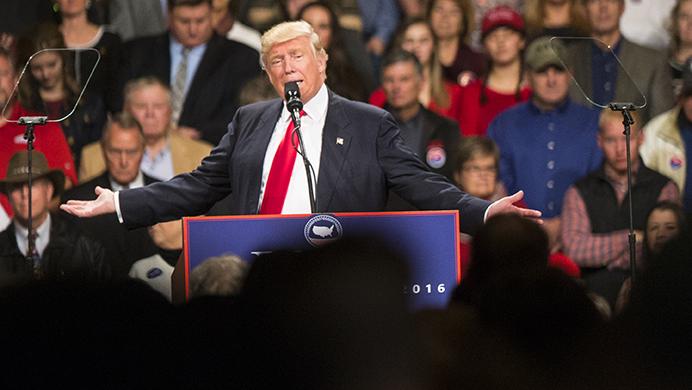I’m a centrist who supports both Republican and Democratic values. I’m fiscally conservative, pro-business, pro-women’s rights, pro-public education, a civil-rights proponent, infrastructure supporter, and an advocate for consolidated city and county government and post-high-school vocational/technical/trade and higher education training.
If given a forced choice edict to pick one principle that represents me, push-come-to-shove, it would be pro-business. Why? At age 69 with 45 years of marketing experience, I’ve observed, regardless whether we have a good or bad mayor, governor, or president, we either thrive, or not, because of the business sector.
Business is the name of the game because 87 percent of America’s Gross Domestic Product depends upon the success or failure of our business sector. The government sector makes up the remaining 13 percent.
I’m worried about the direction our 45th president is taking us, especially as a pro-business value laden person, for four reasons.
First, since Jan. 20, our 45th president has desired a weaker currency and declared the dollar “is getting too strong.” He recently told the Wall Street Journal he likes “a dollar that’s not too strong and lots of bad things happen with a strong dollar.”
I applaud Trump for promising to boost American exports, create jobs, and broaden our prosperity. But a weak dollar runs counter to these three goals. A weaker dollar harms America’s competitiveness, raises prices, curtails job creation, and depletes workers’ earnings and savings. A weak dollar does not work in theory or in practice. The conservative Wall Street Journal concluded, “Unless Mr. Trump changes course, it sounds like the path to a one-term presidency.”
Second, uncertainty over the president’s agenda and his habit of publicly berating business leaders is causing firms to be more cautious and defensive. As David Kotok of Cumberland Advisers said, “When businesses are dealing with a series of unknowns (e.g., uncertain fiscal 2018 budget, raising the nation’s debt ceiling, no specific tax-reform plan, obscure infrastructure proposal, health-care reform, size of military expansion in Afghanistan, immigration reform, workforce development policy, etc.), the instinct of decision-makers like CEOs is to defer decisions.” Deferring decisions means not hiring new workers and/or expanding inventory, which slows down the economy.
RELATED: Lane: Businesses should be involved in politics
Third, when Trump reacted the way he did after a neo-Nazi rally in Charlottesville in early August, never explicitly scolding racist white supremacists at first blush, that was the straw that broke the camel’s back. As a result, a number of companies whose representatives purposely resigned from Trump’s Manufacturing Council and also walked away from his Strategy and Policy Forum include: 3M, Boeing, Campbell Soup, Disney, General Electric, General Motors, IBM, Intel, Johnson & Johnson, JPMorgan Chase, Merck, Pepsi-Co, Tesla, Uber, Under Armour, United Technologies, and Walmart. Companies greatly value diversity in the workplace, embrace civil rights, and can ill afford to make their customers, employees and stockholders unhappy by even remotely supporting our 45th president’s decorum.
Fourth, political rifts among Trump, business leaders, Republican-controlled Congress, and the electorate have magnified investor doubts regarding the administration’s ability to accomplish its agenda. In particular, the tax cuts they had anticipated would boost corporate profits. Investors are running out of reasons to keep buying U.S. stocks.
RELATED: Trump’s trade move sparks concern among Iowans
When CEOs from the largest companies and Main Street business owners, Republican legislators, and investors are bolting away from Trump’s presidency, and Trump doesn’t understand America needs a “strong dollar,” I’m worried. The anxiety, fear, trepidation, consternation, dismay, and apprehension you hear from the business world is for real.
We are at an economic, let alone political, tipping point not seen since 1776.
— Steve Corbin,
Professor emeritus of marketing, University of Northern Iowa



